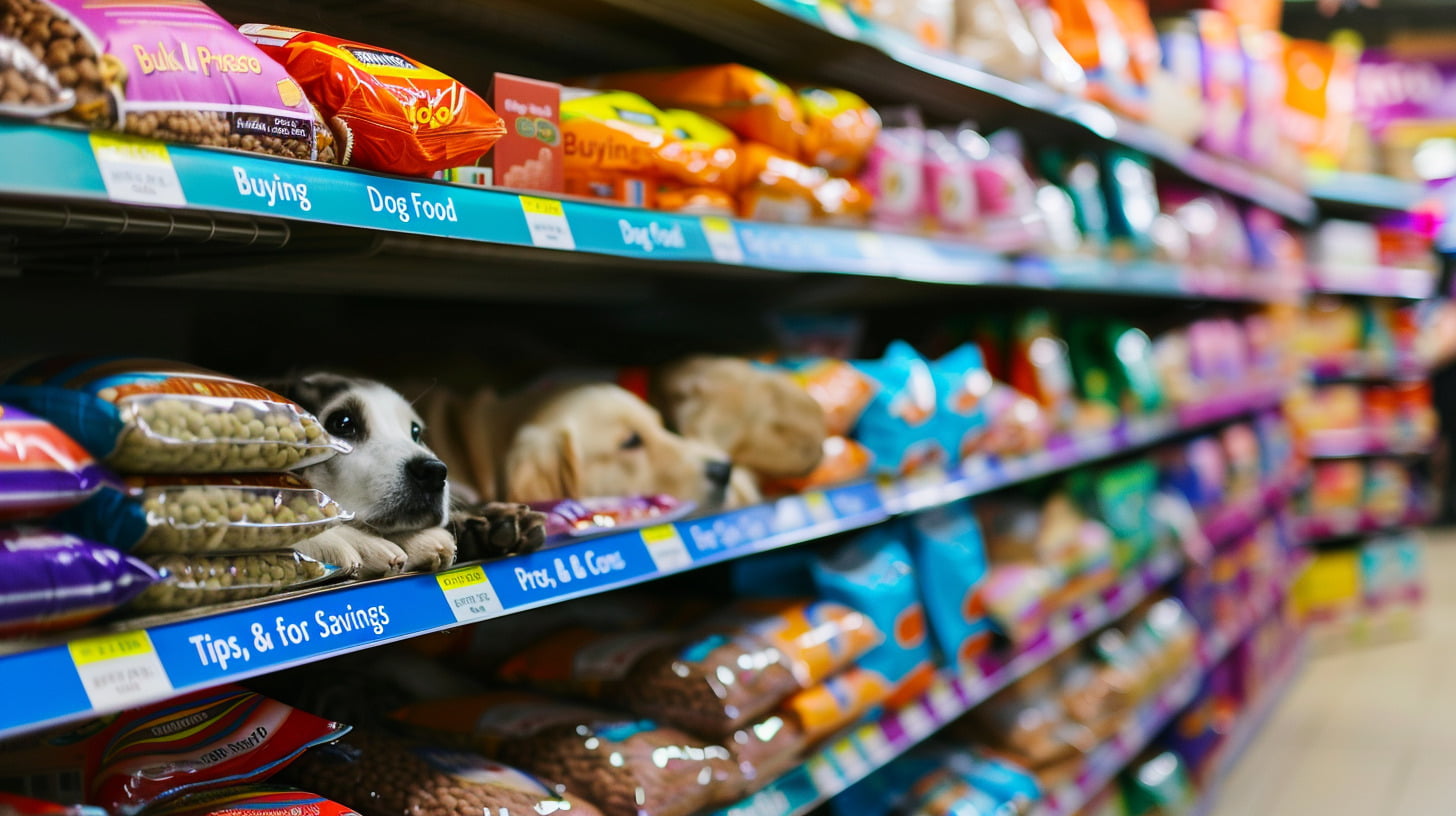Are you tired of those frequent trips to the pet store, hauling heavy bags of kibble? Or perhaps you’re looking for ways to save some cash on Fido’s chow? If so, buying dog food in bulk might be the perfect solution for you! Bulk dog food, simply put, means buying larger quantities of food at once, rather than those smaller bags you usually grab off the shelf. This can come in various forms, from giant bags of kibble to ordering in bulk from online retailers or pet food subscription services.
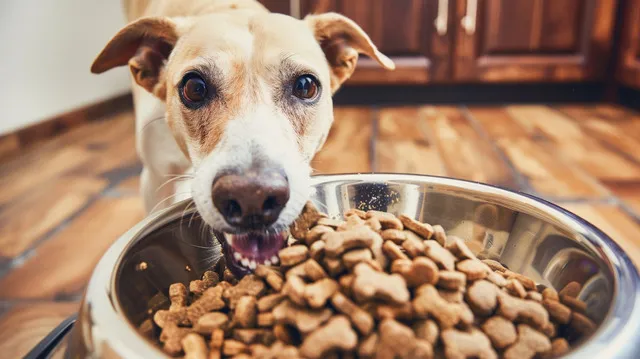
But hold on a second! Before you dive headfirst into the world of bulk buying, there are some important benefits and risks to consider. Bulk dog food can be a real lifesaver (or should I say, dog-saver?) for busy pet parents, but it’s not always the right fit for every pup and their human.
Benefits of Buying Dog Food in Bulk
Let’s face it, we all love a good bargain! And bulk buying dog food can be a real money-saver, especially if you have a big, hungry pup or a whole pack to feed. Here’s the lowdown on why bulk buying can be a boon for your budget:
Cost Savings
The most obvious perk of buying in bulk is the potential to save a pretty penny. Bulk dog food typically comes with a lower price per pound than those smaller bags. Those savings can really add up over time, especially if your dog has a hearty appetite or you’ve got multiple furry mouths to feed.
Convenience
Ain’t nobody got time for constant trips to the pet store! Bulk buying can be a real lifesaver in the convenience department. Instead of frequent dashes to grab another bag, you can stock up on a larger quantity and rest easy knowing your pup’s food bowl will be full for weeks or even months. Plus, many online retailers and pet food subscription services offer bulk buying options with convenient home delivery, saving you even more time and hassle.

Reduced Packaging Waste
If you’re looking to lessen your environmental pawprint, buying in bulk can be a great way to do it. Larger bags or containers of dog food generally mean less packaging waste compared to multiple smaller purchases. Less packaging means less waste going to landfills, which is a win for both your wallet and the planet.
Guaranteed Supply
We’ve all been there – that moment of panic when you realize you’re almost out of dog food and the pet store is closed. Yikes! Buying in bulk ensures you’ve got a steady supply on hand, so you won’t have to worry about running out unexpectedly. This is especially handy if you live in a remote area or if your pup has specific dietary needs and you need to stock up on a particular type of food.
Risks of Buying Dog Food in Bulk
While bulk buying dog food can be a real lifesaver (or should I say, dog-saver?) for busy pet parents, it’s not all sunshine and rainbows. Before you fill your shopping cart to the brim, it’s important to be aware of some potential drawbacks:
Spoilage
One of the biggest concerns with buying dog food in bulk is the risk of spoilage. If not stored properly, those giant bags of kibble can become stale, rancid, or even infested with pests before your pup has a chance to polish them off. This is especially true for dry kibble, which can easily go bad if exposed to air and moisture. So, if you’re considering buying in bulk, make sure you have a cool, dry, and airtight place to store it.
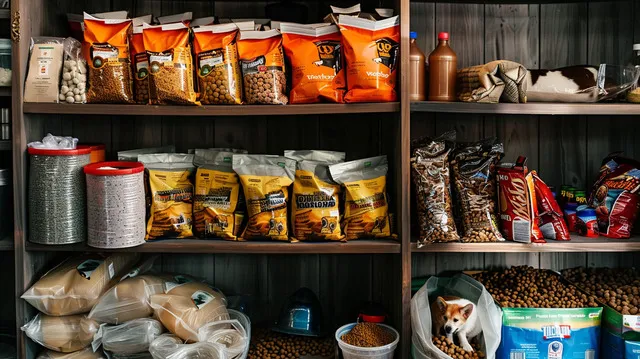
Upfront Cost
Bulk buying might save you money in the long run, but it can also put a dent in your wallet upfront. Those jumbo-sized bags or bulk orders can come with a hefty price tag, which might be a financial strain for some pet parents. Before you splurge on a bulk purchase, take a good look at your budget and make sure it’s a feasible option for you.
Storage Space
Let’s be real, those giant bags of dog food take up a lot of space! If you live in a small apartment or have limited storage, bulk buying might not be the best option for you. Before you stock up, make sure you have enough room to store the food properly, ideally in a cool, dry place where it won’t be exposed to sunlight or heat.
Potential for Food Aversion
Variety is the spice of life, right? Well, the same goes for our furry friends. If your dog eats the same food day in and day out, they might eventually get bored and develop a food aversion. To avoid this, consider rotating different flavors or brands of dog food, or mixing in some fresh food or toppers to keep things interesting.
How to Decide if Buying Dog Food in Bulk is Right for You
So, is bulk buying the right move for you and your furry friend? Well, it depends! There are a few key factors to consider before you take the plunge:
Consider Your Dog’s Needs
Not all dogs are created equal, and the same goes for their dietary needs. When deciding whether to buy in bulk, it’s important to consider your dog’s individual needs. Here are a few things to keep in mind:
- Age: Puppies, adult dogs, and senior dogs all have different nutritional requirements. Make sure the bulk food you choose is appropriate for your dog’s age.
- Breed: Some breeds are prone to certain health conditions that may require specific diets. Do your research to see if your dog’s breed has any dietary restrictions or special needs.
- Size: Larger dogs obviously eat more food than smaller dogs. Make sure you buy enough food to last for a reasonable amount of time, but not so much that it spoils before your dog can eat it all.
- Activity level: Active dogs need more calories than couch potato pups. Choose a food that provides enough energy for your dog’s activity level.
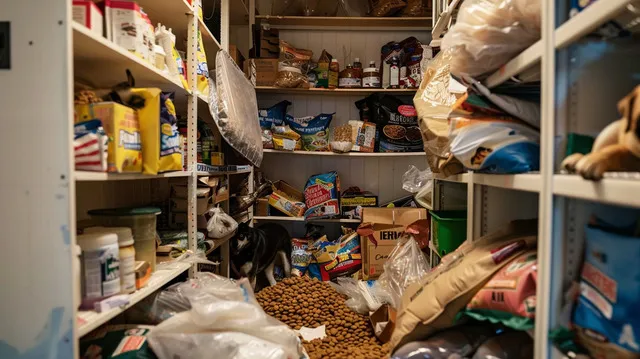
Consider Your Storage Space
Before you buy a mountain of dog food, take a good look around your home and ask yourself: “Do I have enough space to store this?” Bulk dog food takes up a lot of room, so it’s important to make sure you have adequate storage space.
- Dry kibble: Can be stored in a cool, dry place in an airtight container.
- Canned food: Should be stored in a cool, dry place and used within a few days of opening.
- Frozen food: Requires freezer space and should be thawed before serving.
Consider Your Budget
Bulk buying can save you money in the long run, but it does require a larger upfront investment. Consider your budget carefully before making a bulk purchase.
- Calculate the cost per pound: Compare the price per pound of bulk dog food to the price per pound of smaller bags. Make sure you’re actually saving money by buying in bulk.
- Factor in the expiration date: Don’t buy more food than you can use before it expires.
- Set a budget: Decide how much you’re willing to spend on dog food each month and stick to it.
By carefully considering your dog’s needs, your storage space, and your budget, you can make an informed decision about whether buying dog food in bulk is right for you.
Tips for Buying Dog Food in Bulk
Ready to take the plunge into the world of bulk buying? Here are a few tips to make sure you’re getting the most bang for your buck and keeping your pup’s tummy happy:
Choose the Right Type of Food
Not all dog foods are created equal when it comes to shelf life. Here’s a quick rundown of what to expect:
- Dry Kibble: This is the most common type of bulk dog food and usually has the longest shelf life, lasting for months if stored properly. Look for kibble with airtight packaging to keep it fresh.
- Canned Food: While convenient, canned food doesn’t last as long as kibble once opened. If you’re buying in bulk, make sure you can use it all before it goes bad.
- Frozen Food: This can be a great option for bulk buying, but it requires freezer space. Make sure you have enough room to store it before stocking up.
Buy from a Reputable Source
Just like with any food, it’s important to buy dog food from a reputable source. This ensures that you’re getting fresh, high-quality food that hasn’t been sitting on a shelf for ages. Look for brands with good reputations and check reviews from other pet parents before making a purchase.
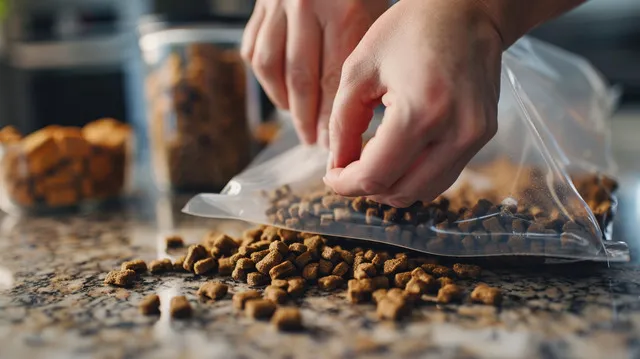
Store the Food Properly
Proper storage is key to preventing spoilage and keeping your dog’s food fresh and tasty. Here are a few tips:
- Dry Kibble: Store in a cool, dry place in an airtight container. Avoid storing in the garage or other areas where temperatures can fluctuate.
- Canned Food: Unopened cans can be stored in a pantry or cupboard. Once opened, transfer the remaining food to an airtight container and store in the refrigerator.
- Frozen Food: Store in the freezer and thaw in the refrigerator before serving.
Use the Food Within a Reasonable Timeframe
Even with proper storage, dog food doesn’t last forever. It’s important to use it within a reasonable timeframe to ensure your dog is getting the freshest and most nutritious food possible. Check the expiration date on the packaging and aim to use the food before it expires.
Conclusion
So, there you have it! We’ve delved into the pros and cons of buying dog food in bulk, exploring the potential cost savings and convenience, as well as the risks of spoilage, storage challenges, and potential food aversion. Now, it’s up to you to weigh the options and decide if bulk buying is the right fit for your furry friend.
Remember, there’s no one-size-fits-all answer when it comes to feeding your dog. The best choice depends on your dog’s individual needs, your budget, and your lifestyle. If you have a large or multi-dog household and ample storage space, bulk buying can be a real game-changer, saving you money and trips to the pet store. However, if you have limited space or a picky eater, it might be better to stick with smaller bags.
Ultimately, the most important thing is to choose a food that is nutritious, safe, and that your dog enjoys. Whether you buy in bulk or not, always prioritize your dog’s health and happiness. And don’t forget to have fun with it! Trying new foods and flavors can be a great way to bond with your furry friend and keep them excited about mealtime.
So, what do you think? Is bulk buying the right move for you and your pup? Share your thoughts and experiences in the comments below!
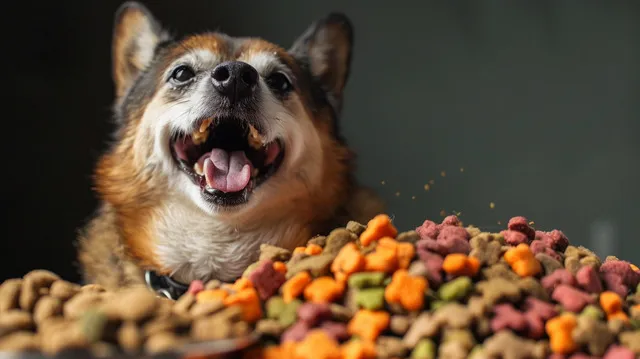
FAQs
Can buying dog food in bulk help me manage my pet’s weight better?
Yes, buying in bulk can help with portion control and avoid overfeeding by allowing you to pre-measure meals and track consumption more accurately.
How does the shelf life of different types of dog food (kibble, canned, raw) affect my bulk buying decision?
Different types have varying shelf lives, which directly impacts your storage needs and how often you need to repurchase. Kibble generally lasts longest, followed by canned, then raw.
Are there any specific brands that offer better deals for bulk dog food purchases?
Yes, some brands specialize in bulk or offer discounts for larger quantities. Researching and comparing brands can help you find the best value.
Does buying dog food in bulk increase the risk of foodborne illnesses for my pet?
If stored improperly, the risk of spoilage and contamination increases, potentially leading to foodborne illnesses. Proper storage in airtight containers and cool, dry places is essential.
What are the best storage containers for bulk dog food to maintain freshness and prevent spoilage?
Airtight containers, ideally opaque to prevent light exposure, are recommended for optimal freshness and to prevent pests. Consider food-grade bins or resealable bags.
How can I transition my dog to a new bulk-bought food without causing digestive upset?
A gradual transition is key. Mix the new food with the old, gradually increasing the new food’s proportion over 7-10 days to allow your dog’s digestive system to adjust.
How does bulk buying impact the nutritional value of dog food over time?
Proper storage is crucial. Nutrients can degrade if exposed to air, moisture, or extreme temperatures. Ensure proper storage to maintain the food’s nutritional integrity.

Healthy dogs mean happy dogs, and that makes me happy! I’m here to share all the tips for keeping your best furry friend in top shape, from puppyhood to their golden years.

